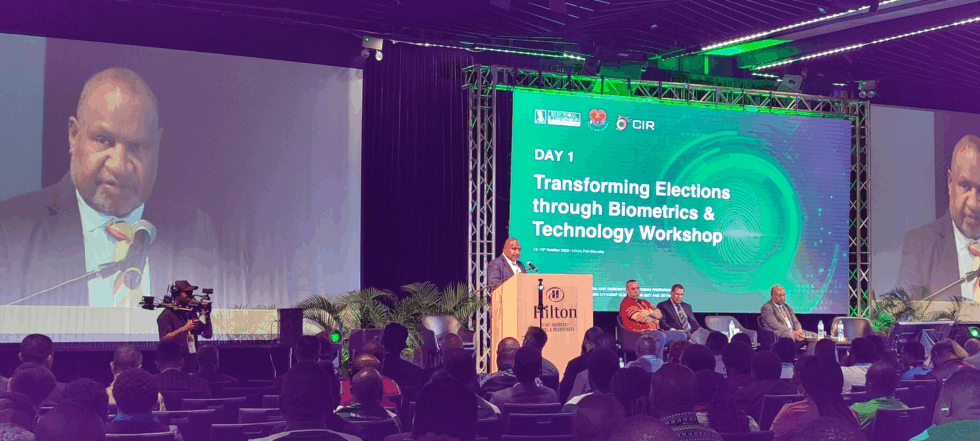Port Moresby, 13 October 2025
The Papua New Guinea Electoral Commission has commenced the “Transforming Elections through Biometric & Technology Workshop” at the Hilton Hotel in Port Moresby, running from 13th to 15th October. The workshop aims to explore how biometric systems and digital technologies can modernize and strengthen the country’s electoral process.
Hosted by the Electoral Commission with support from the PNG Civil Identity Registry and the Government, the event has brought together national leaders, international experts, and technology providers to chart a path toward more transparent, secure, and efficient elections.
The workshop was addressed by Prime Minister Hon. James Marape, Hon. Richard Masere Minister for Administrative Services and Minister Assisting the Prime Minister on Constitutional Matters as well as and Governor Hon. Allan Bird who took part in most of the discussion in day one of the workshop through his role as Chairman of the Special Parliamentary Committee on Elections.
All three leaders emphasized the urgent need to rebuild public trust in the electoral system through the adoption of digital tools and innovation.
PM Marape reminded participants — including representatives from the Judiciary, Electoral Commission, National Statistics Office (NSO), Civil and Identity Registry (NID), and international partners such as the Philippines, Malaysia, and the United Nations — that the integrity of elections underpins PNG’s democra
“We are not playing monkey business here — the heart of democracy is people’s choice,” he said.
“Time is running out. A day wasted in conversation is a day lost for our country. My government is 100% committed to ensuring the people’s choice is protected and reflected in 2027 and beyond.”
PM Marape said PNG’s election system had suffered recurring weaknesses in every national election since 2002 — from roll inflation to delays in counting — and that the country could not afford to repeat the same mistakes.
“A generation is foolish when it ignores its weaknesses and lives through them,” he warned, quoting Albert Einstein’s definition of insanity as “doing the same thing over and over and expecting different results.”
The Prime Minister said biometric technology — incorporating fingerprint identification and unified national databases — would significantly reduce fraud, double voting, and manipulation in future elections.
“Each of us has one fingerprint unique to ourselves. Using biometric systems will eliminate double voting, block voting, and other irregularities that have weakened trust in our elections,” he said.
“Technology is available, and it is time we use it to remove human interference and ensure transparent, credible results.”
PM Marape urged citizens not to fear digital transformation, pointing to nations such as India, where technology has enabled single-day voting and near-instant results.
He also called for greater coordination between agencies — particularly the NSO, NID, and Electoral Commission — to establish a single national population database that could underpin the electoral roll and all other government services.
“The data must speak to each other. One population database must be the foundation of our systems,” he said.
Prime Minister Marape said Cabinet had, since 2021 (Decision No. 134/21), established a pathway toward technology-enabled elections, and that the 2026 national budget would allocate resources to support biometric implementation and system integration.
“We have 20 months to prepare before writs are issued in April 2027,” he said.
“Our government will fund and support these reforms in 2026 so that our people can exercise their Section 50 right to vote freely and fairly.”
PM Marape said it was better to lose government under a transparent process than to win under a system clouded by irregularities.
“I would rather lose government in a fair process than win under a flawed one,” he declared.
“The true test of leadership is to strengthen democracy — not manipulate it.”
The Prime Minister appealed to all Members of Parliament, political parties, and citizens to support the reform effort, emphasising that democracy depends on the people’s active participation.
“Democracy will keep our country together — not one-man rule or any other system,” he said.
“When elections come, do not just talk on Facebook. Go and vote. Your vote constructs your government.”
A key highlight was a presentation by Andrew Mpesi, Chief Election Officer of Malawi, who shared his country’s experience with biometric voter registration and eVoting. His insights underscored the importance of national readiness and reform in achieving successful digital transformation.
Global technology provider Smartmatic also presented case studies from countries where biometric systems have improved electoral integrity and operational efficiency.
Secretary of the Department of Information and Communications Technology (DICT), Mr. Steven Matainaho, outlined a strategic roadmap for PNG’s transition to eVoting. The proposed steps include:
- Establishing a trusted Digital ID system covering 80–90% of citizens aged 18 and above
- Using Digital ID to verify and deduplicate the Common Roll
- Procuring an end-to-end biometric solution with remote connectivity via Starlink
- Investing in training, capacity building, and change management
- Conducting test trials before a full national rollout
Matainaho noted that the DICT has already laid the policy and institutional foundations for this transformation, citing the Digital Transformation Policy 2020, the Digital Government Act 2022, and the establishment of the National Cyber Security Centre (NCSC) as key enablers.
To ensure effective implementation, a multi-agency governance framework was proposed, assigning clear roles to key institutions:
- PNGCIR: Provide foundational ID data for voter verification
- Electoral Commission: Oversee roll updates and biometric system deployment
- NICTA: Regulate connectivity, data privacy, and digital standards
- DICT: Lead national policy direction and ensure interoperability
- DJAG: Ensure legal alignment with electoral and privacy laws
- NCSC: Safeguard systems against cyber threats
Hon. Richard Masere is leading the initiative, with DICT and other agencies standing ready to support its implementation.
“The time is short — but eVoting is still possible if we move decisively and in unity,” said Matainaho, signaling a bold step toward a digitally empowered electoral future for Papua New Guinea.

